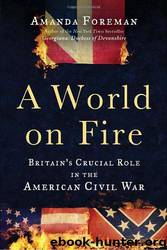A World on Fire: Britain's Crucial Role in the American Civil War by Amanda Foreman

Author:Amanda Foreman
Language: eng
Format: mobi, epub, azw3
Tags: Europe, International Relations, Modern, General, United States, Great Britain, Public Opinion, Political Science, History, 19th Century, Civil War Period (1850-1877)
ISBN: 9780375504945
Publisher: Random House
Published: 2011-12-24T00:19:04+00:00
Ill.41 General Longstreet’s corps crossing the Blue Ridge from the Shenandoah to the Rappahannock, by Frank Vizetelly.
Jeb Stuart succeeded in driving the Federals away from the passes, but he could not prevent General Pleasonton from obtaining the information sought by Hooker. By June 22 the Federals knew for certain that Pennsylvania and not Washington was Lee’s objective. Stuart was unsure what Lee wished him to do in the face of so many threats—should he guard the gaps, follow the Confederate army up the Shenandoah Valley, or create a diversion and try to maintain the deception that the capital was in danger? Lee sent him two notes, on June 22 and 23, which the cavalry commander interpreted to mean that he could use his own judgment, provided he rejoined the main body of the army in good time. Stuart decided to go riding and raiding in between the Federal army and Washington.9
Fremantle at last arrived at Lee’s headquarters at 9:00 A.M. on June 22. He recognized the general immediately but refrained from going up to him; the expression on Lee’s face discouraged frivolous interruption. Instead, Fremantle asked a member of the staff where he might find Francis Lawley. After introducing him to Lee’s aides, Lawley invited Fremantle to join them for breakfast. There was another guest at the table, a Prussian captain named Justus Scheibert, who was an official observer from the Royal Prussian Engineers. The conversation centered mostly on Jeb Stuart and his successful repulse of Pleasonton’s cavalry at the mountain passes. For the moment, at least, Stuart’s reputation was on a reprieve. But he had lost one of his most popular volunteers—the Prussian soldier Heros von Borcke, who had been severely wounded at Aldie.
Lawley understood Fremantle’s desire to meet Lee, but persuaded him to wait until the atmosphere was less frenetic. He suggested they leave the camp and deposit themselves ten miles farther north, at Winchester, where there would be decent lodgings and a blacksmith for Fremantle’s suffering horse. They spent the next couple of days together, exploring the battle-scarred countryside and staying out of the Confederates’ way. The houses looked bleak and dilapidated, with those still inhabited being used as hospitals for the wounded. The travelers visited the mud hole that had once been Commissioner Mason’s elegant plantation. “Literally not one stone remains standing upon another,” wrote Fremantle, surprised at the vitriol behind the Federal attack.
On June 24, leaving Lawley to write his Times dispatch, Fremantle went foraging for their horses without success. He eventually found virgin grass four miles outside town, but all the hay and corn had been seized long ago. He was experiencing on a small scale one of Lee’s greatest anxieties: how to feed his army. As usual, Lawley hid the situation from his readers. He conceded that the Southern army was “still ragged and unkempt” but declared that all had good shoes and that the animals were “for the most part sleek and fat.” Lawley was unable to finish his report that day or the next.
Download
A World on Fire: Britain's Crucial Role in the American Civil War by Amanda Foreman.epub
A World on Fire: Britain's Crucial Role in the American Civil War by Amanda Foreman.azw3
This site does not store any files on its server. We only index and link to content provided by other sites. Please contact the content providers to delete copyright contents if any and email us, we'll remove relevant links or contents immediately.
The Secret History by Donna Tartt(18949)
The Social Justice Warrior Handbook by Lisa De Pasquale(12169)
Thirteen Reasons Why by Jay Asher(8848)
This Is How You Lose Her by Junot Diaz(6835)
Weapons of Math Destruction by Cathy O'Neil(6219)
Zero to One by Peter Thiel(5736)
Beartown by Fredrik Backman(5681)
The Myth of the Strong Leader by Archie Brown(5458)
The Fire Next Time by James Baldwin(5386)
How Democracies Die by Steven Levitsky & Daniel Ziblatt(5174)
Promise Me, Dad by Joe Biden(5114)
Stone's Rules by Roger Stone(5053)
A Higher Loyalty: Truth, Lies, and Leadership by James Comey(4907)
100 Deadly Skills by Clint Emerson(4882)
Rise and Kill First by Ronen Bergman(4741)
Secrecy World by Jake Bernstein(4703)
The David Icke Guide to the Global Conspiracy (and how to end it) by David Icke(4658)
The Farm by Tom Rob Smith(4467)
The Doomsday Machine by Daniel Ellsberg(4451)
